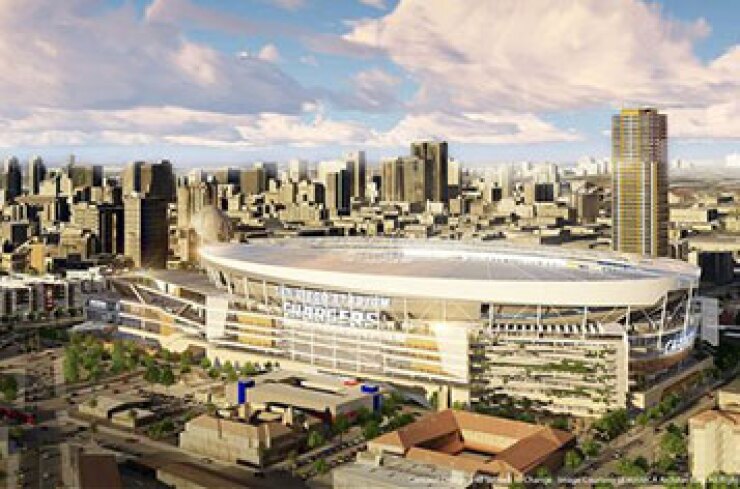
LOS ANGELES — A study commissioned by San Diego's city government raised concerns about whether a hotel tax the Chargers football team placed on the November ballot will raise enough revenue to fund a $1.8 billion stadium-convention center project.
The San Diego City Council hired Public Resources Advisory Group to produce the
The Chargers hired Goldman Sachs, which is also the financing and structuring agent for the Chargers, to conduct sample cash flow analyses.
"At this time, we believe it is not possible for the city to know if the projected revenue stream would be sufficient to meet overall coverage," PRAG said in the report. "Our sensitivity analysis found many scenarios where there would be insufficient funds to meet all requirements."
San Diego Mayor Kevin Faulconer, who has long been a supporter of a new stadium, declined to comment on the report; according to a spokesman, he has not taken a position on the initiative.
PRAG based its research on the wording of the Chargers initiative, historical looks at interest rates and tourism growth trends, and a sample cash flow analysis from Goldman Sachs.
PRAG ran three scenarios to determine if the city would be at risk if voters approve the Chargers initiative.
The scenarios contemplated by PRAG suggest the project could have financial issues as there is "considerable uncertainty as it relates to all three of the main variables."
It is difficult to predict how interest rates and transient occupancy tax growth will look over the next 30 years, the life of the bonds, according to the report.
One key assumption that PRAG said it did not verify was whether the $1.8 billion projected cost for the project is reasonable.
"We believe it is a critical factor for the city to have a much greater confidence in the estimated project cost." PRAG wrote in the report.
San Diego voters will have two separate initiatives to consider in November. The initiative proposed by the Chargers would fund construction of a football stadium and convention center annex.
The second initiative proposed by a group led by Attorney Cory Briggs would prohibit a waterfront expansion of the current convention center and raise the transient occupancy tax to 15.5% from 12.5% to help finance an off-the-waterfront convention center facility and pave the way for an expansion of San Diego State on the Qualcomm Stadium site in Mission Valley. Qualcomm is where the Chargers play now.
The Chargers' measure would increase the hotel tax to 16.5% to help service $1.15 billion in bonds for the proposed new downtown stadium and convention center. The Chargers and NFL would contribute the other $650 million of the estimated $1.8 billion cost.
Both initiatives need voter approval because they would raise hotel room taxes.
The Chargers could leave San Diego for Los Angeles, where the team has an optional deal to share a new stadium with the Los Angeles Rams that is currently under construction. The Rams are playing in the Los Angeles Memorial Coliseum until the new $2.6 billion stadium in Inglewood is completed before the 2019 season.
The Chargers have taken aim at Councilman Chris Cate, who has come out in opposition to the plan. The Chargers have posted comments on their website criticizing Cate and have asked fans to call him.
Cate told the Bond Buyer in a July article that he can't support a project that would be 64% financed with public funding.
"We want the Chargers to stay in San Diego but not at any cost," he said in July. "Their plan asks too much of taxpayers."





